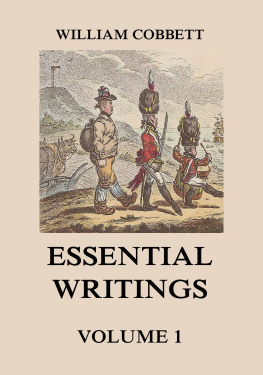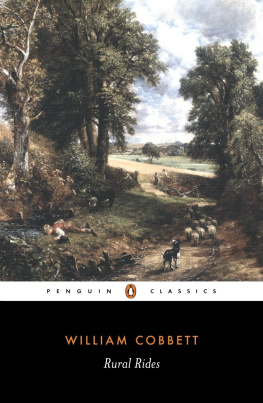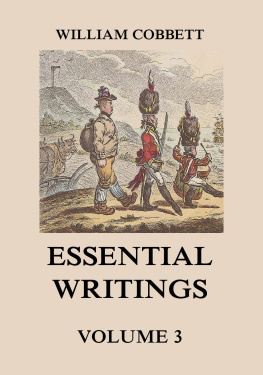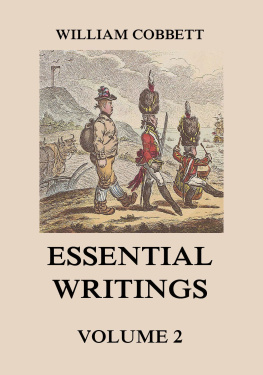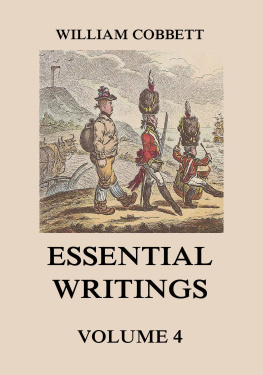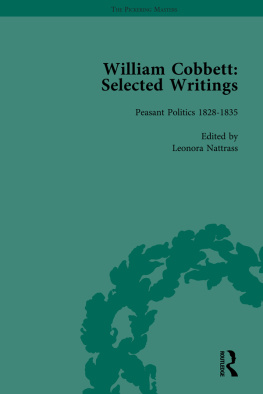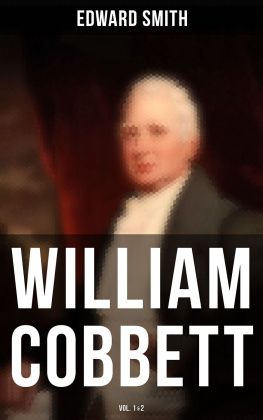EDITORS PREFACE.
The political writings of our late father are contained in exactly one hundred octavo volumes, namely, of Porcupines Works twelve, and of the Weekly Political Register eighty-eight; the former being a selection of pamphlets and articles written in a monthly publication, and articles written in a daily paper, at Philadelphia, from the year 1794 to the year 1800; and the latter being a weekly publication on politics, begun in the year 1802, and ended with its authors life, in June 1835.
Having undertaken to abridge these two works, it is but right that we should fully and frankly state why we do it at all; what we propose to give in the abridged shape, at what times we shall publish, and to what extent the work will go; and, in order to do this fully, we will first explain what tempted us to the undertaking. On looking at the formidable row of volumes, we could not help asking ourselves What is the use of the works in their present shape? For, the fame of an author must depend upon the notoriety and usefulness of his works, and, as these hundred volumes cannot be had, and therefore cannot be useful in their present shape, we resolved upon making the attempt to bring into a very much smaller compass the essence of what they contain. For this purpose we mean to take the best papers on the most interesting topics, from the earliest of our authors writing to the last; and to bring them together in such a way, as shall make it an easy task to trace his whole literary career, and the political history of the time in which he has taken a part in politics. We at first thought of an arrangement of matters, but found it impossible to make it. The chronological order of the writings will therefore be preserved, and his first essay in print will be the first of our abridgment; and, as the work will not extend to a greater length than six volumes, a perfect index will render it almost as easy to refer to particular papers and topics, as if the arrangement had been the one that we first intended.
That the publication will be useful we have no doubt. The matters treated of in the Register, not only have been of interest and great importance, but they are so still, and they are becoming more and more so every day that we live.
But why rake up the works of Porcupine? Porcupine was a Tory, will, perhaps, be said to us by some of our friends. In the first place, Porcupines works will live, whether we like it or not; they have already become, if not absolutely scarce, more valuable by two fold than they were six months since; we cannot smother them, and if we could, we would not; and, as to the toryism, the publishing of selections from these works will give us the best means, and perhaps the fairest excuse, for clearing away much misapprehension on this score. The selections from Porcupine will show how greatly his objects and conduct have been misrepresented. We publish them in order to show how far his conduct was different from what the world has been taught to believe; and incidentally they will form a sort of history of American politics during an interesting period, and they will show his own progress in style and manner of writing.
It is very true that Mr. Cobbett at the age of 32, quitting France as the revolution broke out, and having lived eight years in the barracks of New Brunswick, in the condition of private soldier and then sergeant-major, did, in the United States, very warmly espouse the cause of England, of her King, Constitution, and people: it is true that when he looked on the bloody details of the revolution in France, and saw the people of America praising, imitating in their fashions and manners, and even praying for, the leaders and fraternities engaged in them; and that when he saw American writers attempting to change their old calendar for that of France, with its fructidor and ventose; and saw also the French Ambassador gravely propose to them to adopt a new French scheme of weights and measures in the place of the old English one; and a silly Scotchman attempt to persuade them to blot out all English recollections by changing the written language of their fathers, he burned with more than ordinary indignation; and it is also true, that when he saw a powerful faction, not merely in the country, but in the United States Government itself, anxious to injure his own country by procuring commercial connexions between France and America, for the avowed purpose; it is true that when he saw this, and saw an evident anxiety in the same faction, to accede to the declared wishes of France, by engaging America in war with England, he broke silence, and did his utmost to avert what must have been calamitous to her. This is all true; and it is also true, that in doing this, he did not stay to draw distinctions between English reformers and French revolutionists: all that looked with complacency on the National Convention, all that called themselves Citizen, were, to him, blood-thirsty operatives of the guillotine, or the abettors of those who were so. But it is not true that he ever was in his principles a tory, in the vulgar and modern sense of that word. Tory now means a man who would govern by corrupt means, a cruel, iron despot, a proud and greedy oppressor. These are the qualities that any ordinary man now attributes to the Tory, and the Tories have acquired the character by their practices. But to say that Porcupine is chargeable with such, is the grossest misapprehension of character that can be imagined; and we think that every sensible reader of his works will be convinced, that the great aim of them is to unite the interests of the Kingly Government of England and of the Federal Government of America. There was nothing wrong in this; it was not only commendable, but it was the duty, of an Englishman, having the power, and being in the situation to give his power effect, to do his utmost to preserve to England the friendship of her lost colonies, and to prevent their throwing their weight into the scale of France.
It is a very common notion, that he wrote against the American Government; that he did nothing in America but abuse the statesmen and the people of that country. Nothing can be more false. He earnestly advocated the administrations of Washington and Adams, in opposing the French party in America, and it is not too much to say, that he gave them very efficient support. To understand this, the reader ought to be acquainted with American politics from the close of the old American war (the war of Independence) to the death of Washington; but, as it is not every reader that has the information, we cannot enter upon our task without giving a very short narrative of facts to prepare him for what we are about to place before him.
Mr. Cobbett arrived in America in the last week of October 1792, and fell immediately into the company of the numerous emigrants who had fled from France and St. Domingo to avoid the perils of revolution. He remained till August 1794, imbibing every days news of the tragedies that were acting under the new French Republic, and learning the politics of the one in which he was living. His mind was quickly made up upon the iniquity of the scenes in France, and it was but another step, to hold in abhorrence all who applauded the revolution. On American politics, he learned, that the constitution at first established in that country after the war of Independence, had been found inefficient soon after it was tried, and that in 1787 it was reformed; and, moreover, that this reformation had divided the leading men of America into two formidable and fierce parties; one party desiring a close imitation of the English form of Government, and the other desiring a more popular and mere republic; the distinctive marks being, that one desired to have a President and Senate elected for life, and the other a President and Senate elected for terms of years. Add to this, that the party who were the admirers of the English form, wished to conciliate the friendship and alliance of England, and that the other party wished for the friendship and alliance of France, and then we have the key to his motives for joining the English party, and pouring out his wrath upon that which favoured France. The event that provoked him to write his first essay, was something said against the English Government by Dr. Priestley, who arrived an emigrant from England in June 1794. Whatever was said by the infuriated party of America against her he could stand; but condemnation from an Englishman he could not; and, therefore, he attacked the Doctor in an anonymous pamphlet which was published at Philadelphia, which had a considerable sale, brought the writer at once into the field of strife, and made him, not long after, forsake his peaceful occupation for that boisterous one in which he passed the remainder of his days. At the age of 33, then, he published this pamphlet, on which we shall only remark here that the reader will see in it many of the excellences of his after writings; the same clearness, the same humorous bitterness, and a good deal of invective, though rather less grammatical accuracy. But of this he will be his own judge. The next publication was a pamphlet under the title of A Bone to gnaw for the Democrats; and the title suggests to us to explain further, that the American parties above alluded to, were known as Democrats and Aristocrats, or Federalists and Anti-federalists, or Whigs and Tories. These distinctions will be clearly understood if we take the Anti-federalist and the Federalist; for these were the real American distinctions, the others being borrowed either from France or England. At the close of the war of independence, in 1783, the thirteen States of America united under an Act of Confederation, but each State kept itself so completely sovereign in everything that concerned it, that, in matters of war and peace, and foreign commerce, there was no general government of sufficient power to give effect to the Confederation. This caused the reformation of 1787 before alluded to, which gave larger power to the Congress, and instituted an executive in the person of the President.

